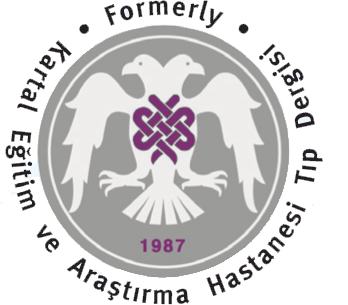ISSN : 2587-0998
Laparoskopik Kolesistektomide Farklı Anestetik Ajanların Postoperatif Kognitif Fonksiyonlar Üzerine Etkileri
Nilgün Narman Aytan1, Elif Bombacı2, Banu Çevik212
GİRİŞ ve AMAÇ: Bu çalışmada, sevofluran veya desfluran ile uygulanan inhalasyon anestezisi ile propofol ile uygulanan intravenöz anestezinin postoperatif erken dönem kognitif fonksiyonlar üzerine etkilerinin karşılaştırılması amaçlandı.
YÖNTEM ve GEREÇLER: Bu çalışmaya ASA I-III sınıfı, 30-70 yaş arası, elektif laparoskopik safra kesesi ameliyatı geçiren hastalar dahil edildi. Ameliyattan bir gün önce Mini-Cog testi yapılarak hastaların kognitif fonksiyon düzeyleri belirlendi. Hastalar rastgele Grup I (Desfluran), Grup II (Sevofluran) ve Grup III (Propofol) olmak üzere üç gruba ayrıldı. Propofol ve remifentanil roküronyum ile anestezi indüksiyonu yapıldıktan sonra tüm hastalara endotrakeal entübasyon uygulandı. Anestezi idamesi sırasında tüm hastalara uygulanan remifentanil infüzyonunun yanı sıra bispektral indeksi (BIS) 40-60 olan desfluran, sevofluran inhalasyonu veya propofol infüzyonu ile anestezi derinliği sağlandı. Tüm hastaların postoperatif 5., 10., 20. ve 30. dakikalarda Modifiye Aldrete Recovery Skorları (MARS) ölçüldü ve kaydedildi. Ağrı düzeyleri postoperatif 10., 20. ve 30. dakikalarda görsel analog skala (VAS) ile değerlendirildi. Mini-Cog testi ameliyat sonrası 24. saatte aynı hekim tarafından tekrarlanarak ameliyat öncesi değerlerle karşılaştırıldı.
BULGULAR: Üç grup arasında demografik özellikler, ameliyat ve anestezi süresi, ameliyat sonrası MARS ve VAS değerleri açısından fark yoktu (hepsi için p>0.05). Desfluran ve Propofol gruplarında ameliyat öncesi ve ameliyat sonrası Mini-Cog test skorları arasında anlamlı fark görülmezken (p>0.05), sevofluran grubunda Mini-Cog testinin Propofol grubuna göre ve Desfluran grubuna göre anlamlı derecede düşük olduğu görüldü (sırasıyla p=0.002 ve p=0.012).
TARTIŞMA ve SONUÇ: Desfluran ve propofolün kognitif fonksiyonlara olumsuz etkisinin olmadığı, sevofluranın ise postoperatif kognitif fonksiyonlara olumsuz etkisinin olduğu sonucuna varıldı.
Anahtar Kelimeler: Desfluran, Mini-Cog testi, postoperatif bilişsel işlev bozukluğu, propofol, sevofluran
Effects of Different Anesthetic Agents on Postoperative Cognitive Functions in Laparoscopic cholecystectomy
Nilgün Narman Aytan1, Elif Bombacı2, Banu Çevik21Department of Anesthesiology and Reanimation, Turgut Özal University Faculty of Medicine Malatya Training and Research Hospital, Malatya, Türkiye2Department of Anesthesiology and Reanimation, University of Health Sciences, Kartal Dr. Lutfi Kirdar City Hospital, Istanbul, Türkiye
INTRODUCTION: In this study, it was aimed to compare the effects of inhalation anesthesia applied with sevoflurane or desflurane and intravenous anesthesia with propofol on early postoperative cognitive functions.
METHODS: This study included patients with the ASA I-III classes, aged between 30-70 years and who underwent elective laparoscopic gallbladder surgery. The cognitive function levels of the patients were determined by performing the Mini-Cog test the day before the surgery. The patients were randomly divided into three groups as Group I (Desflurane), Group II (Sevoflurane), and Group III (Propofol). After induction of anesthesia with propofol and remifentanil rocuronium, endotracheal intubation was performed in all patients. In addition to the remifentanil infusion administered to all patients during the maintenance of anesthesia, anesthesia depth was provided with desflurane, sevoflurane inhalation or propofol infusion, with a bispectral index (BIS) of 40-60. The Modified Aldrete Recovery Scores (MARS) were measured and recorded at the postoperative 5th, 10th, 20th, and 30th minutes in all patients. Pain levels were evaluated with a visual analog scale (VAS) at the 10th, 20th, and 30th minutes postoperatively. The Mini-Cog test was repeated by the same physician at the postoperative 24th hour and compared with the preoperative values.
RESULTS: There was no difference in demographic characteristics, duration of surgery and anesthesia, postoperative MARS and VAS values between the three groups (for all, p>0.05). While there was no significant difference between the preoperative and postoperative MiniCog test scores in the Desflurane and Propofol groups (p>0.05), it was observed that the Mini-Cog test in the sevoflurane group was significantly lower than in the Propofol group and Desflurane group (p=0.002 and p=0.012, respectively).
DISCUSSION AND CONCLUSION: It was concluded that desflurane and propofol did not have negative effects on cognitive functions, while sevoflurane had a negative effect on postoperative cognitive functions.
Keywords: Postoperative cognitive dysfunction, Mini-Cog test, desflurane, sevoflurane, propofol
Makale Dili: İngilizce




















